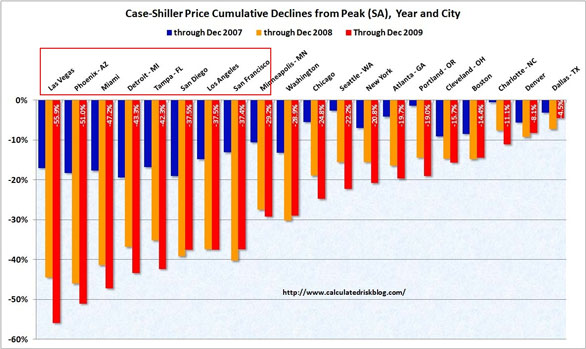From a recent post titled “What Are These Three Numbers” on the economics blog Econbrowser comes this chart:

“The first bar is the impact on the unified budget balance of the Economic Growth and Tax Relief Reconciliation Act (EGTRRA) of 2001. (Ed. note: That’s the first Bush tax cut.) The second is the impact on the budget balance of the Jobs and Growth Tax Relief Reconciliation Act (JGTRRA) of 2003 (the second Bush tax cut). The third bar is the CBO estimated impact on the deficit of the Patient Protection and Affordable Care Act (aka the health care bill) proposed in the Senate on November 19, for 2010-2019.”
These numbers, represented in billions of 2010 dollars, were taken from the non-partisan Congressional Budget Office.
As you can see, the two tax cuts increased the deficit about $1.8 trillion dollars, while the proposed health care bill will actually modestly decrease the deficit. As one of the main anti-health care bill criticisms is its cost, this is a potentially effective talking point. (Plus, both of the tax cut bills passed via the reconciliation process, the proposed path to passage for the health care bill and the subject of a major to-do between the two political parties.)
But not everyone is buying the argument. Two responses to the post on the site:
You betray your agenda in that you are using statistics to lie.
These are not even remotely similar and your facile comparision is misleading. You juxtapose two laws that are mostly tax cuts (which allow people to keep more of what they earn) with a tax increase and spending bill.
Yes, I will stipulate that the Republicans were irresponsible by cutting taxes without also cutting spending, but they were at least starting from a position of small surpluses. It isn’t immoral to return some of that income to those that produced it.
The CBO score for the (health care bill) is also horribly misleading. It omits the “doctor fix” and is frontloaded with deficit reduction before the expanded benefits kick in. Tax increases start immediately and ramp up ahead of outlays until they take the lead in 2016.
In addition, I find it hard to take the cost estimates from 2015-2019 at face value. Every single expansion of government involvement in health care has ended up costing more than the initial estimates. I fail to see why this would be different…
————————————————————————————————————–
This analysis is BS. It basically states that the health care act doesn’t hurt the deficit. However, a lot of the taxes are back end loaded (read, never going to be enacted) and the other taxes to pay for this cover 10 years, to provide services for 4 or 6 years, meaning it takes twice as many taxes per year to cover the costs on an annualized basis, meaning this really is all a bunch of BS and going to result in additional huge deficits. Especially since there are no real cost control measures.






















